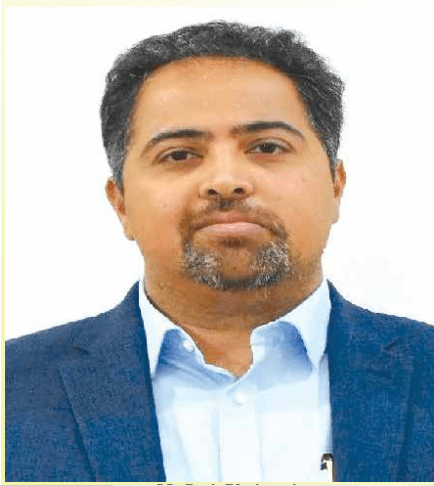
Mr Amit Bhojwani is the Chairman/CEO of SAM Pharmaceuticals Limited. In this exclusive interview with Patrick Iwelunmor, he shares his thoughts on various issues concerning the Nigerian pharmaceutical industry, particularly the growing demand for increased local medicine manufacturing. Excerpts:
What has been the vision driving the operations of SAM Pharmaceuticals, especially now that the company is becoming more visible in the Nigerian pharmaceutical space?
I appreciate this question and take it personally. As you’ve rightly noted, there’s been a new breath of life at SAM. Since I took over as MD, we’ve been working hard to continue the legacy passed down to us. This is more than just business; it’s personal. We are building upon what we inherited, and what you are witnessing is just the beginning. Many more great things are on the way.
As a key player in the Nigerian pharmaceutical industry, what would you say are the major challenges that require urgent attention?
The primary challenges, I’d say, are the menace of substandard drugs and supply chain gaps. However, we are confident that with the Renewed Hope agenda, things are moving in the right direction. We are excited to be part of this vision and look forward to contributing to its actualization.
There has been a growing outcry against drug importation. In fact, one of the focal points of the 7th Nigeria Pharma Expo is boosting local pharmaceutical manufacturing. What is SAM Pharmaceuticals doing to contribute to this vision?
We are proud to announce that we are constructing a brand-new state-of-the-art facility in Otta, Ogun State. It will be ready by the first quarter of next year and will increase our current output fivefold. This facility will significantly reduce reliance on imported products. Some of the pharmaceuticals we currently import under our brand names will soon be produced locally. By 2025, we aim to manufacture at least 90 percent of our products locally.
In terms of niche, can you tell us about your most successful product based on patronage?
The product that is very close to our hearts and has taken a significant market share is Acipep. It’s now, unofficially or officially, the number one antacid in the country. It’s known by the catchphrase “Omo, cool down” because when you take it, it cools you down. We’re very proud of it, and you can expect more innovative products from us soon.
How would you assess the performance of the Bola Tinubu-led federal government in healthcare delivery?
We are optimistic and happy with the government’s support for local pharmaceutical manufacturing, especially the tariff and import duty reductions. We’re just waiting for these policies to be successfully implemented. We know the green light has been given from the top, and now we’re eager to see the relevant officers put it into action.
How have you been coping with the unstable forex market in Nigeria?
Honestly, it has been quite challenging. It’s something we revisit every week, and it might be our biggest challenge. I probably speak with our chief financial officer more often than I speak with my wife, constantly evaluating how price fluctuations affect our finished products. However, we are hopeful that a solution will emerge soon.
What advice would you give to the Nigerian pharmaceutical sector?
Quality first. Forget about profit at the beginning. Focus on improving the Nigerian healthcare sector. It’s about creating something you’d be proud to give to your own children. That’s the principle we follow at SAM Pharmaceuticals.
How long has SAM Pharmaceuticals been doing business in Nigeria, and what are some achievements you can point to?
SAM Pharmaceuticals was incorporated in 1971, and we’re proud to have served the Nigerian health sector for over five decades. As we complete our new mega factory by the first quarter of 2025, we’re positioning ourselves for even more growth over the next 50 years. Our greatest achievement is being a trusted brand for leading institutions and hospitals across the country. We now look forward to building our brand across West Africa and the entire African continent.
Do you agree with those clamoring for Nigeria’s independence from drug importation? Why?
Yes, the last pandemic showed us how challenging and costly it can be to rely on international supply chains for essential health needs. With a strong local regulator like NAFDAC, Nigerian-made products are of the highest standards. In fact, we’re now looking to reverse the trend of importation by exporting to other African countries.
Do you think Nigeria has what it takes to be self-sufficient in drug production, considering the unstable power and energy situation?
While Nigeria has its fair share of challenges, we’re confident that the country has the local capacity and skillset to be self-sufficient. There are already initiatives to produce APIs locally, and I have no doubt that more inputs, including some excipients, will also be manufactured locally soon. With continued government support to address economic and infrastructural challenges, more people will be willing to invest in local production.
What is your take on the recent Executive Order on pharmaceuticals signed into law by President Tinubu? Do you think it will have a significant impact on the country’s access to affordable medicines?
The Executive Order is encouraging for local manufacturers, and we hope all government agencies involved in its implementation provide full support, as it benefits the common man by driving prices down. Duty waivers on machinery and factory inputs will reduce capital requirements for increasing local capacity, which will attract more investors to the sector.











